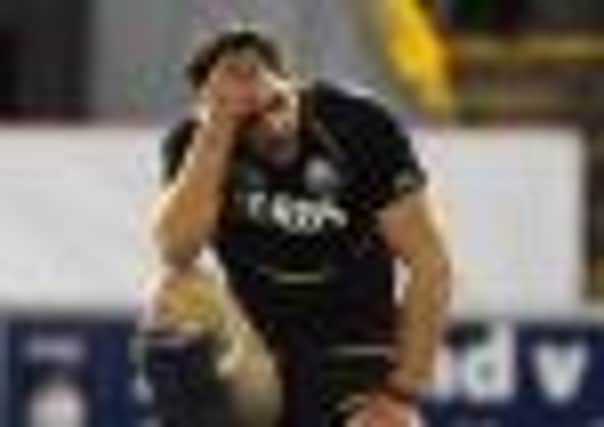Allan Massie: Andy Robinson and the fatal flaw in Scottish rugby


Saturday was a dreadful day for Scottish rugby and a dreadful performance by the team. Andy Robinson, having said “there will be consequences” and “it reflects on me”, has honourably taken responsibility and fallen on his sword. Some of the players will, I hope, think that they let him down, just as they let themselves down. Robinson committed himself wholeheartedly to the Scottish cause. There were times when he seemed on the verge of creating a good team, but, despite a successful tour of Argentina, and victories over Australia, Fiji and Samoa this summer, results in the Six Nations and in last year’s World Cup have been disappointing, and performances too often poor.
Eight matches have been played in the northern hemisphere this year – and all have been lost. The only argument about Saturday’s match was whether it was even worse than the last Six Nations game in Rome, or only every bit as bad.
Advertisement
Hide AdAdvertisement
Hide AdThere was no lack of endeavour, but there was a sad lack of composure, skill under pressure, and common sense. Charitably one may say that some of the players were suffering the after-effect of hard matches against New Zealand and Australia, and that, if we had played Tonga in the first of these autumn internationals, we might have won comfortably. Nevertheless, the overall record suggests that Robinson and his squad of players have run out of excuses. Too many bad decisions were made, on and off the field.
Given the present scrum laws, it is not intelligent to opt for a scrum close to the opposition try-line. Coaches might usefully make this clear to their captains. You cannot, however, blame the coach for the absence of support when a player does make a break, as when Greig Laidlaw cut clean through the Tongan defence, and support was inadequate.
If a team in any sport suffers prolonged failure, then a change of coach is called for. This is natural enough. However loud the protestations of loyalty may be, the day comes when players and coaches no longer wholly believe in each other, and when the supporters lose first heart, then interest.
But no-one should suppose that a change of coach will magically revive the fortunes of Scottish rugby. Since we won the last Five Nations title in 1999, the Scotland XV has had four head coaches: Ian McGeechan, Matt Williams, Frank Hadden, and Andy Robinson. McGeechan, Hadden and Robinson all enjoyed occasional success; none did so consistently. Results for the three were much of a muchness.
One tries to remain hopeful and supportive, but the problems of Scottish rugby run deep, and can’t be resolved by the substitution of one coach for another. Putting it very simply, naturally talented young Scottish players are granted professional contracts on evidence of promise, while often lacking basic skills without which no New Zealander or Australian of the same age would be offered one.
So they are always playing catch-up. It is easier to rise through the ranks and reach at least the fringe of the international team in Scotland than in our southern hemisphere rivals.
Ireland and Wales are in the same boat. Like us, they have brief periods of success when chance delivers a small group of world-class players at the same time. Ireland has had this good fortune recently, as we did in the 1980s and 1990s. Wales has perhaps been fortunate in this respect more often. Nevertheless, even in golden years, the three Celtic nations have been consistently inferior to the SANZAR (South Africa, New Zealand and Australia Rugby) ones.
A new hand on the tiller may steer the craft into smoother waters, a new coach may give the players a lift. But the influence is likely to be temporary, because no new coach can do much to eradicate the essential weakness of the game here. Nevertheless one must appointed.
Advertisement
Hide AdAdvertisement
Hide AdThere are two internal candidates. The Australian Scott Johnson was recruited by Andy Robinson as attack coach and has not yet outstayed his welcome. Johnson is a bit like these football managers who flit from club to club, rarely out of a job for long; they often achieve some early success before being shown the door.
Then there is Sean Lineen, presently employed by the SRU to guide youth development and to act as a global scout for players with a Scots connection. Lineen, the original kilted Kiwi, has identified himself completely with Scottish rugby, first as player, then as coach of Glasgow.
It would be sensible to appoint him as interim coach for the Six Nations, and to take stock at the end of the tournament. After all, whoever takes over from Robinson will have very little time with the international squad between now and the Calcutta Cup match on 2 February.
Lineen is regarded with respect and affection, and in our present predicament might just offer the invigorating and cheerful influence that is evidently needed and is perhaps all that a new coach can provide in such a short time.